These are unprecedented times for us in the building trades. The COVID-19 crisis has brought on tough challenges, many changes and endless obstacles, but the industry is strong and resilient—right now we lean on each other. We are all in this together! And, as each day brings more and more coverage on the COVID-19, its Read more
COVID-19

These are unprecedented times for us in the building trades. The COVID-19 crisis has brought on tough challenges, many changes and endless obstacles, but the industry is strong and resilient—right now we lean on each other. We are all in this together!
And, as each day brings more and more coverage on the COVID-19, its impact on communities, and the economy, it’s also revealed some incredible stories we want to shine a light on. One such story is of Cherie & Jack Jester, owners of Benjamin Franklin Plumbing and Mister Sparky in Oak Hall, Virginia.
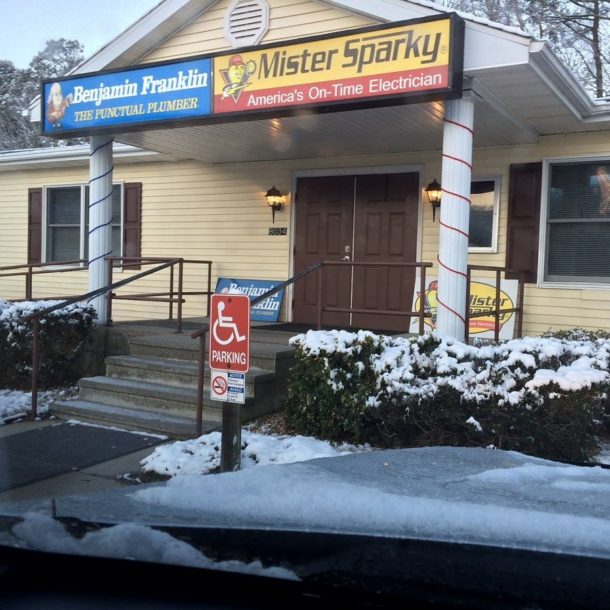
Cherie, Jack and their team of employees began helping their community through a program to assist people, especially those struggling from abuse, addiction and underserved in the community. The Jesters and their team of plumbers and electricians make deliveries twice a week to a neighborhood women’s shelter. Items being delivered include necessities such as toiletries, diapers, baby wipes, food, and various other supplies to give to those who are struggling. The company has had a relationship with this shelter for several years and have recently added a food and supply drop off location outside the office so the general public can stop by to make donations that will be delivered by their team. Working with a local radio station, they are also publicizing the program to drive awareness of the need in the community.
In addition to the great work Cherie and Jack are doing, they are looking for future programs to assist and hope to team up with other Mister Sparky and Benjamin Franklins in the region. They’ve been lucky during the past few months of COVID-19, as their team is staying busy and all the techs are working. Initially, Cherie and Jack could not find supplies for masks, but through their community outreach, found someone to create them for the whole team. They follow strict guidelines and protocols for social distancing and limit customer contact as much as possible.
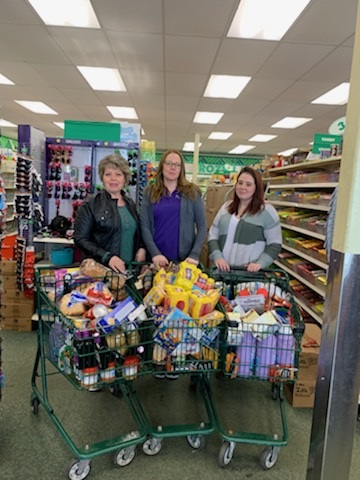
I recently had a chance to ask Cherie about their business, philanthropy, and how the pandemic has changed the way they do business.
MH: Give us a little background on your team with Mister Sparky and Ben Franklin Plumbing?
Cherie: Jack and I started our company in 1989 as a new construction plumbing contractor. We decided to change our primary focus to service in the late 1990’s and joined the Benjamin Franklin Plumbing franchise in the fall of 2006, and we added Mister Sparky to our portfolio in 2008. Our son, Lee, has grown up in the business and serves currently as our Operations Manager. Our team of professionals at Benjamin Franklin Plumbing and Mister Sparky Electric can solve plumbing and electrical problems quickly and efficiently with our guaranteed on-time service, fully-stocked trucks and highly-skilled technicians. Some of our specialty services include bathroom remodeling, water testing and purification, home automation, house rewiring, among many others.
MH: How was the relationship created with the shelter?
Cherie: Our relationship with the local neighborhood women’s shelter began through our office manager, Leesa. Leesa had been incredibly involved for several years with a special Christmas project for the shelter families. She and a few other volunteers would take a “Christmas Wish List” of items (toys, clothing, coats) for every child and parent in the shelter and go shopping for them, wrap the gifts, and then deliver everything right before Christmas for the shelter staff to distribute. Our company and team members all contributed at first and our involvement continues to grow. Last year, we wanted to increase our giving, so we matched the contribution each team member gave. This encouraged more participation from our entire staff.
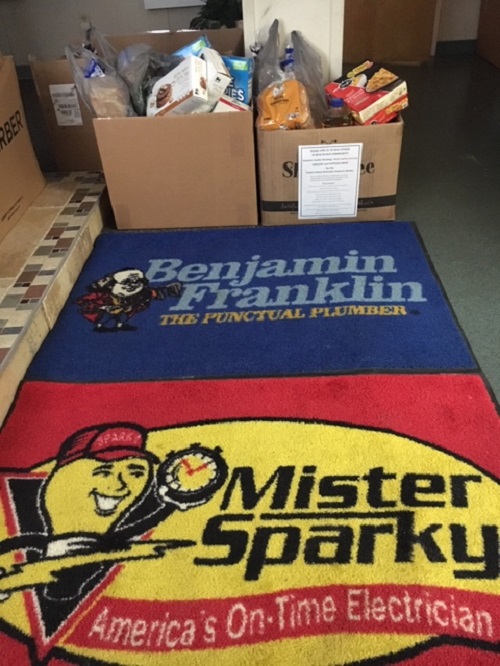
MH: How has COVID-19 changed the way you do business?
Cherie: We have been fortunate enough to be able to keep all of our team working in spite of the impact from COVID-19 on the economy, and we are very thankful. The health and safety of our customers and employees has been our biggest priority, which is why we implemented procedures based on information from the Center for Disease Control and Prevention (CDC). We require all of our employees to wear Personal Protective Equipment (PPE) including masks and gloves, as well as practice social distancing and regularly wash their hands and sanitize, and we’ve been making changes to reduce our in-person contact.
MH: What other programs or areas do you see as potential for supporting philanthropic endeavors?
Cherie: We love giving back to the community and are always looking for ways to help, especially since we have a strong support system from our employees who aspire to make a positive impact. We’d love to partner with nearby Mister Sparky and Benjamin Franklin Plumbing franchisees in the area to continue to build upon our giveback efforts. Beyond the women’s shelter we work with, we are long-time supporters of our local volunteer fire companies and we are reaching out to a local homeless shelter to see if we can help them in any way.
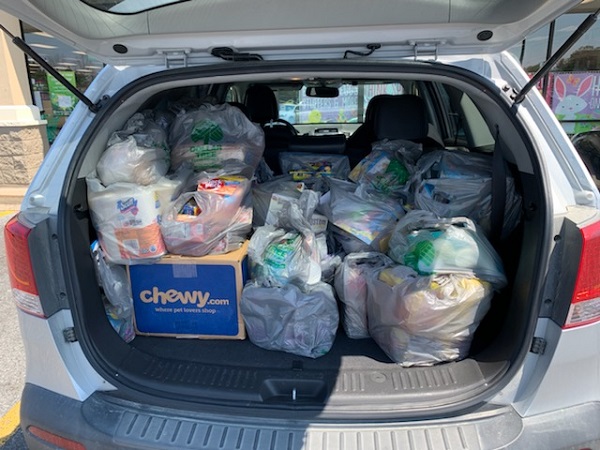
MH: Can you share any insight or personal stories about someone that has benefited from the support?
Cherie: When COVID-19 began to impact our community, we learned that there was an increase of families being taken into the shelter. Due to the increase there was a high demand for extra items, so we wanted to help. We decided to go shopping for them ourselves, collect items at our office from our team and anyone else wanting to help, and make deliveries to the shelter during the pandemic. Through these efforts we’ve donated several boxes of food, toilet paper, and various other supplies to give to people who are struggling.
MH: What do you hope others in the industry may take from reading about how you support in your community?
Cherie: We wanted to help our community in this time of need and are overwhelmed with the support we received from our employees, our local community in Virginia and our franchise family with Mister Sparky and Ben Franklin Plumbing. We hope our story will bring inspiration to others and motivate them to look for ways they can be a blessing wherever they are.
Having the team from Benjamin Franklin Plumbing is a gift for those in their community with little means or in need of a helping hand. As this pandemic continues with unknown speed, we can’t forget the most vulnerable who need even more support. So, if we are all in this together, we must include, plan for, and protect our most vulnerable too.
Cherie, Jack and the team of employees, Thanks You!
McLean, Va. – Plumbing Manufacturers International (PMI) delivered important insights to its members on federal infrastructure legislation and critical housing and trade issues during yesterday’s PMI Virtual Legislative Forum. “Our members gained access to valuable information from experts with remarkable knowledge and insights into issues affecting our industry,” said Kerry Stackpole, PMI CEO/executive director. “PMI members Read more
McLean, Va. – Plumbing Manufacturers International (PMI) delivered important insights to its members on federal infrastructure legislation and critical housing and trade issues during yesterday’s PMI Virtual Legislative Forum.
“Our members gained access to valuable information from experts with remarkable knowledge and insights into issues affecting our industry,” said Kerry Stackpole, PMI CEO/executive director. “PMI members who could not attend will still have access to the forum’s recording and presentations, as well as to materials they can use to advocate on behalf of their companies to members of Congress.”
The two-hour forum was divided into four sessions. The first session, “Eye on Housing,” provided an economic analysis and forecast of the COVID-19 pandemic’s impact on home and apartment building from Robert Dietz, chief economist and senior vice president for economics and housing policy, National Association of Home Builders. He discussed the current construction and housing industry outlook and how housing will be a leading element for the nation’s overall recovery.
Ed Mortimer, vice president of transportation and infrastructure at the U.S. Chamber of Commerce, provided an update during the second session on various transportation and water infrastructure legislation designed to retain or create jobs, repair old systems, and stimulate consumer spending. He covered some of the key elements necessary to pass this vital legislation, including bipartisan solutions and the need for organizations, such as PMI, to continue their advocacy efforts.
During her presentation on the “Future of Trade in the Wake of COVID-19” during the forum’s third session, trade lawyer Nicole Bivens Collinson reviewed the dynamics of the United States-China tariff negotiations, the United States-Mexico-Canada Agreement (USMCA) effective on July 1, and the impact the pandemic is having on supply chains. Bivens is president of the international trade, customs and export law practice at Sandler, Travis & Rosenberg, P.A.
Collinson discussed the short windows that PMI member companies have to ask the United States Trade Representative (USTR) for extensions to some previously approved China tariff exclusions. Depending on the plumbing product or component, the deadlines to request an extension range from July 7 to July 31, 2020. The extensions would last for one year and are being offered in an apparent bow to concerns about the tariffs’ impact on companies struggling with the coronavirus pandemic. The move would apply to some products excluded from the 25 percent tariffs that the Trump administration imposed on Chinese goods.
The final session, “Outreach to Congress: Take Action and Urge Lawmakers to Support Robust Infrastructure Package,” provided tools and information to assist PMI members in their advocacy efforts for the plumbing manufacturing industry. The tools include a customizable letter that members can use to urge local lawmakers to pass important infrastructure legislation and a directory of Congressional members.
The forum was hosted by Stackpole, as well as by the co-chairs of PMI’s Advocacy/Government Affairs Committee, Troy Benavidez, vice president of public affairs for LIXIL, and Lowell Lampen, engineering director, K&B NA sanitary products, Kohler Co., and Stephanie Salmon, PMI’s government affairs consultant.
MADISON, Wis. In a new study conducted by Wisconsin Safety Council (WSC) and Rural Mutual Insurance Company, 85% of respondents said they “sometimes” or “often” see a coworker come to work sick even though he/she should have stayed home. In the current environment, exposure to sick coworkers is the leading safety concern for workers in Read more
MADISON, Wis. In a new study conducted by Wisconsin Safety Council (WSC) and Rural Mutual Insurance Company, 85% of respondents said they “sometimes” or “often” see a coworker come to work sick even though he/she should have stayed home. In the current environment, exposure to sick coworkers is the leading safety concern for workers in Wisconsin.
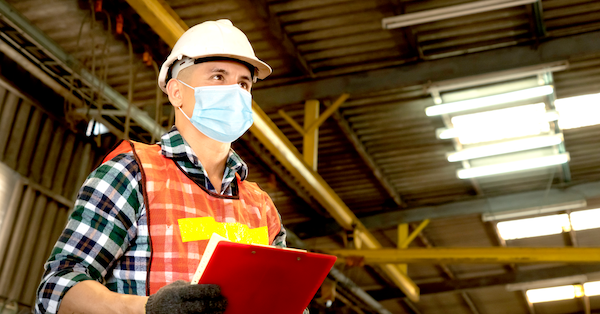
In an effort to identify top workplace safety concerns and provide solutions during National Safety Month in June, WSC and Rural Mutual polled more than 180 WSC members, the majority of whom are safety professionals working in Wisconsin trades, including contractors, manufacturers and construction workers. The study was completed in April.
“Amidst the COVID-19 pandemic, we know businesses and organizations across the state are looking to create safer work environments now more than ever,” said Aaron Huebner, WSC executive director. “This study revealed safety professionals should focus on establishing initiatives that prevent the spread of infection and reduce exposure to employees who are sick.”
The respondents indicated several other top safety risks in the workplace:
- Interacting with hazardous materials (80%)
- Driving for work-related activities (80%)
- Standing for more than two hours in a row (79%)
- Working in high noise levels where a raised voice is needed to talk to people less than four feet away (76%)
A new, free e-book from Rural Mutual and WSC is now available to help safety professionals and trade workers in Wisconsin address these leading safety concerns. The ‘Work Safe in Wisconsin’ e-book offers easy to implement solutions for a safer and healthier workplace.
“Helping Wisconsin businesses lower their safety risks is a big part of Rural’s mission,” said Chris Schlechta, safety and loss control manager at Rural Mutual. “We’re excited to work with WSC to introduce the ‘Work Safe in Wisconsin’ e-book in hopes to inspire workers to jumpstart safety initiatives during National Safety Month and throughout the year.”
The e-book includes tips for those looking to create a safer workplace, including:
- Foster a safety culture. Ensure all employees feel comfortable reporting a safety concern when they see it. See something, say something, do something.
- Give employees a voice at the table. Before implementing a new safety initiative or when elevating existing safety programs, engage the frontlines and ask employees for their feedback.
- Adopt a proactive, not reactive approach. If we wait until an accident happens to address a safety concern, we will never get ahead of the issue.
To download a free copy of the e-book, visit www.ruralmutual.com/insurance/business/work-safe/.
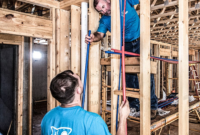
In response to the coronavirus outbreak, plumbers are looking for ways to work more efficiently and adapt to customer needs. But with people observing social distancing requirements and other precautions, we need efficient solutions more than ever. A Snapshot of the New Normal As a plumber, how has your day-to-day routine changed? Even as a Read more
In response to the coronavirus outbreak, plumbers are looking for ways to work more efficiently and adapt to customer needs. But with people observing social distancing requirements and other precautions, we need efficient solutions more than ever.
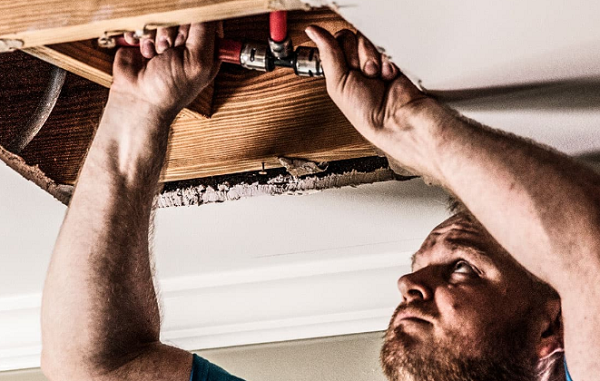
A Snapshot of the New Normal
As a plumber, how has your day-to-day routine changed? Even as a manufacturer of plumbing solutions, we’ve noticed a change in the way our customers work. In the past few months, pros have shared several important trends they’ve noticed:
- Scheduling around other pros on jobsites. With the introduction of staggered shifts in certain construction markets, pros are having to coordinate time around other trades. They can no longer come and go on jobsites as their schedule allows. It’s critical to set a schedule and stick to it. If a firestop installation takes longer than expected, for example, the delay could throw other contractors off schedule.
- Making faster residential service calls. Because of social distancing requirements, plumbers working in homes need to get in and out quickly to keep customers comfortable and reduce the risk of spreading or getting the virus. They need ways to make repairs and install fixtures as quickly as possible without sacrificing quality.
- Conducting virtual consultations and meetings. On websites and social media profiles, some plumbing contractors are inviting customers to schedule a virtual consultation through video conferencing platforms like Zoom. During the appointment, the customer can explain the issue they’re having and receive an initial quote. This reduces time in-home and can ensure efficiency.
- Installing more touchless faucets. Not surprisingly, reducing the spread of germs and viruses is currently top-of-mind for most consumers. Some plumbers have noticed an increase in requests for touchless faucet installations from health-conscious homeowners.
While the pandemic highlighted the need for solutions that get pros in and out faster and help them adapt to shifting customer needs, it’s difficult to make changes in a short amount of time. In some cases, pros don’t have time to perform services in the exact same way as they did six months ago.
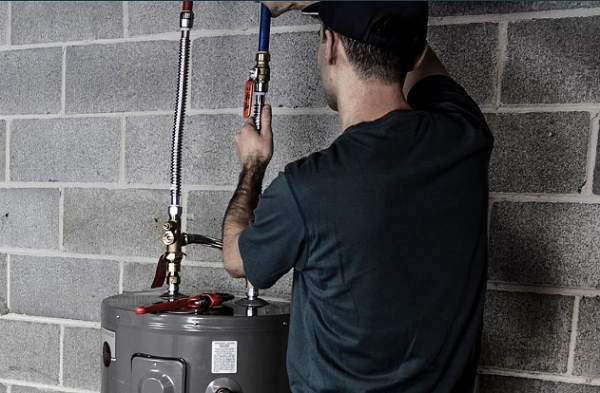
At RWC, we’ve always offered solutions that make plumbers’ jobs more efficient, like durable SharkBite push-to-connect fittings and HoldRite firestopping systems. But the past few months has reinvigorated our mission to develop safe, sustainable and efficient solutions. We’re seeking ways to design even more products that cut down on installation without reducing quality and craftsmanship.
So… Where Do We Go from Here?
We can’t pretend to know what the plumbing industry will look like in a month, six months or even a year. Will plumbers continue working around social distancing requirements? Will customer demand for hygienic products like touchless faucets increase?
No matter what the next few months bring, we believe efficiency and adaptability are permanent fixtures. As you continue to improve services for customers, we will support and empower you with plumbing product innovations.
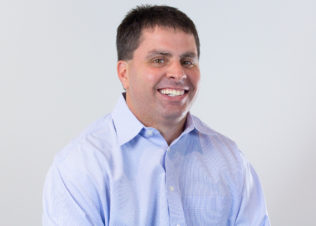 Chris Carrier is the Marketing Director, Americas at RWC – a market leader and manufacturer of water control systems and plumbing solutions for residential, commercial and industrial applications.
Chris Carrier is the Marketing Director, Americas at RWC – a market leader and manufacturer of water control systems and plumbing solutions for residential, commercial and industrial applications.
Companies and building managers can access free resources at the Code Council’s Coronavirus Response Center. Washington, D.C. – As local and state governments are beginning a phased reopening of their economies, the International Code Council has compiled a guide of safety precautions and considerations for businesses looking to resume in-office activities. Acting as an aggregate Read more
Companies and building managers can access free resources at the Code Council’s Coronavirus Response Center.
Washington, D.C. – As local and state governments are beginning a phased reopening of their economies, the International Code Council has compiled a guide of safety precautions and considerations for businesses looking to resume in-office activities. Acting as an aggregate information hub, the Code Council’s Coronavirus Response Center offers relevant information for building professionals and potential occupants to understand the impact the pandemic has had on the industry, as well as for companies who are currently creating plans and strategies to move back into their offices.
Ahead of reopening efforts, the Code Council has made it a priority to educate businesses, office managers and building safety professionals on an important but often-overlooked safety precaution – preparing an office building for re-occupancy. With many buildings reducing or turning off normal system operations during stay-at-home orders, it is critical to properly inspect and prepare a vacant building ahead of resuming regular activities. Without proper preparation and maintenance, the building may pose unrealized hazards to incoming occupants, whether from a heating, ventilation, and air conditioning (HVAC) or plumbing system to a powerless carbon monoxide detector.
Due to the wide range of aspects necessary for reopening a previously unoccupied building, the Code Council’s Coronavirus Response Center covers topics include:
- Addressing any temporary changes needed to building access and exit patterns to accommodate temporary reopening protocols such as employee health screenings, disposal of PPE, or any areas specifically designated for decontamination.
- Visually inspecting and testing the operation of building entrances and exits including doors, revolving doors, and garage doors for proper operation and ensure they are free from obstructions.
- If a building’s water distribution system has been shut down or seen reduced flow, flushing the pipe system with clean, potable water to remove any unwanted debris.
- Facilitating adequate physical distancing protocols, and considerations for revising maximum occupant loads for all buildings and spaces to accommodate 75 gross SF/occupant.
- Closing common areas where personnel are likely to congregate and interact or enforcing strict physical distancing protocols.
- Guidance on disinfecting communal areas from FEMA and the CDC
“COVID-19 has had an unprecedented impact on our society, both economically and socially. As we continue to learn to navigate the new normal and discover what that actually entails, having easy access to information on topics like how to properly prepare a vacant building for reoccupation is crucial, especially during reopening efforts,” said Dominic Sims, CBO and CEO, International Code Council.
Access to the Code Council’s Coronavirus Response Center can be found here, while the full list of tips and considerations for reopening buildings can be found here.
